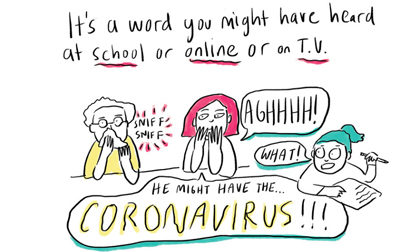Q: In our family, we are doing everything that we can to stay healthy by taking all the measures of hand-washing, social distancing and self-quarantine, but we want to keep up with all of the school work, the adults’ jobs, the many responsibilities. It all a bit overwhelming, and worse, we don’t know how bad it might get or how long it might last. What can we do about the stress?
A: First of all, mental health and physical health are interconnected, so managing stress is a critical part of keeping the immune system strong. APS is committed to supporting students and families throughout all situations, including times of crisis and challenge. The first priority for everyone is to stay well and safe. As a caregiver, you must take care to protect your own mental health, as well as your family’s. This means you have to determine priorities for yourself and your family, based on your unique situation. This may mean “letting go” of getting everything done and meeting others’ expectations. Basic needs come first: housing, food, etc. Here are links that may be helpful in stress management for the adults in your household:
APS educational materials are offered for those who would like to access them, and who are able to do so without adding stress to the family situation. It is important to know that APS staff are looking forward to seeing students when they return, and there will not be any penalties for students who could not or did not access educational materials online. When school resumes the emphasis will be on caring for students, reconnecting, checking in on well-being, and assessing what is needed.
If you need someone to talk to, and you are not in a crisis, you can also check out Mental Health America of Virginia’s Warmline by calling 1-866-400-MHAV(6428) between 9am and 9pm Monday-Friday or 5pm-9pm Saturday and Sunday.
The Disaster Distress Helpline is a national hotline available to anyone and everyone experiencing emotional distress related to any natural or human-caused disaster. This is a 24/7, 365-day-a-year, toll-free national hotline with multilingual, and confidential crisis support. Please call 1-800-985-5990 or text TalkWithUs to 66746 to connect with a trained crisis counselor. Spanish-speakers can call the hotline and press “2” for 24/7bilingual support. The hotline can also connect with counselors in over 100 other languages via 3rd-party interpretation services.
Q: I am having a hard time talking with my child about the coronavirus. I’m worried that any information I provide will add to anxiety and create more questions that I don’t know how to answer. What can I or should I say to my child(ren)?
A: It is very important to remember that children look to adults for guidance on how to react to stressful events. If parents seem overly worried, children’s anxiety may rise. Parents should reassure children that health and school officials are working hard to ensure people throughout the country stay healthy. However, children also need factual, age appropriate information about the potential seriousness of disease risk and concrete instruction about how to avoid infections and spread of disease. Teaching children positive preventive measures, talking with them about their fears, and giving them a sense of some control over their risk of infection can help reduce anxiety.
The National Association of School Psychologists (NASP) and National Association of School Nurses (NASN) offer the following general guidelines when talking with children:
- Remain calm and reassuring.
- Children will react to and follow your verbal and nonverbal reactions.
- Make yourself available.
- Monitor television viewing and social media.
- Maintain a normal routine to the extent possible.
- Be honest and accurate.
View the full publication (includes links in Spanish, Amharic, Chinese, Korean, French, and Vietnamese)
An additional resource published by the Substance Abuse and Mental Health Services Administration (SAMHSA) is available here:
Like adults, some children have pre-existing stressors and conditions which may make them more vulnerable to the current changing conditions. They may develop significant behavioral or mental health needs which should be addressed promptly. If a child or youth experiences a behavioral health crisis which creates an unsafe situation for themselves or others in the home, parents/guardians should:
- Call 9-1-1 if there is an immediate danger to self or others.
- Contact Arlington Emergency Services at 703-228-5160.
- Go to the nearest Emergency Room.
For non-urgent, but concerning behavior, please see resources at Arlington Children’s Behavioral Health.
Q: All of these resources indicate that parents should provide “age-appropriate, factual information” about the virus. What is factual information is available for me to review and consider for my child(ren)?
A: This is a good question. With so much media coverage, the amount of information can be overwhelming to sift through. Here are some resources which provide information at a different levels for parents and guardians to consider. Ultimately, parents have to decide what is most appropriate for their child(ren). Here are some resources for helping kids understand Coronavirus:
 Brainpop info on Coronavirus for kids
Brainpop info on Coronavirus for kids- NPR: Just for Kids: A Comic Exploring the Coronavirus
- For older students, who may have difficulty accepting the preventative measure of social distancing, this Washington Post simulator and article may be of interest: www.washingtonpost.com/graphics/2020/world/corona-simulator/
- Scholastic Teaching Our World Resources on Coronovirus
 Contact
Contact  Calendars
Calendars Careers
Careers Engage
Engage  District
District